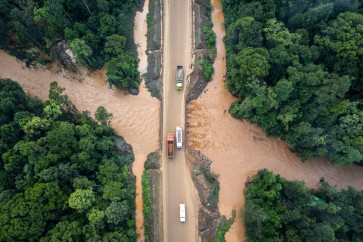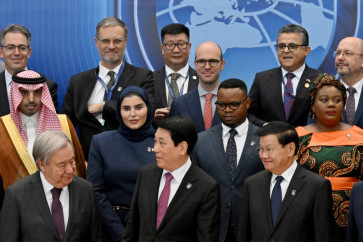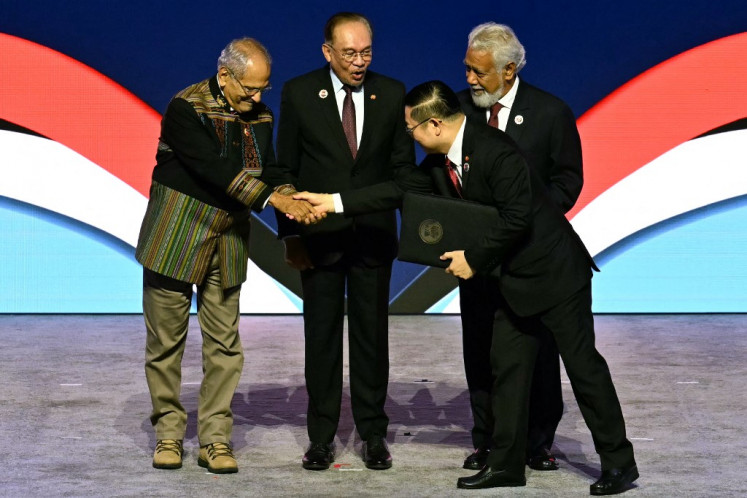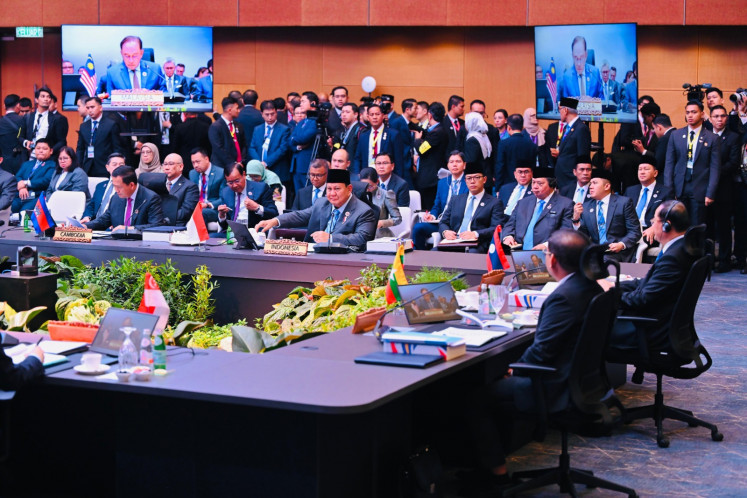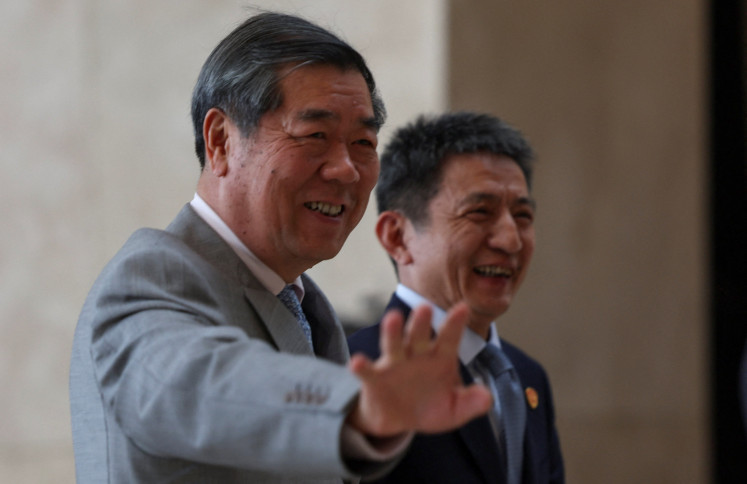Popular Reads
Top Results
Can't find what you're looking for?
View all search resultsPopular Reads
Top Results
Can't find what you're looking for?
View all search resultsThe 21st century regional maritime silk road
After its inception on April 13, 1949 defense cooperation between Indonesia and China survived ups and downs until bilateral relations between the two countries were frozen in October 1967
Change text size
Gift Premium Articles
to Anyone
A
fter its inception on April 13, 1949 defense cooperation between Indonesia and China survived ups and downs until bilateral relations between the two countries were frozen in October 1967.
The two nations normalized ties in 1990 and gave a boost to their defense cooperation under a strategic partnership agreement signed by presidents of both countries on April 25, 2005.
They also signed a memorandum of understanding (MoU) on bilateral defense cooperation in November 2007 that prompted the establishment of a forum for bilateral consultation regarding defense and military cooperation.
It is interesting to note that in fact the legal basis for Indonesia's defense cooperation with China had been laid down earlier than that with the US. Indonesia's profound ties with the US only took shape in the framework arrangement on cooperative activities in the field of defense between them and in the Comprehensive Partnership signed in 2010.
In view of the momentum of China's new leadership and the calculative strategy of President Xi Jinping for 2013-2018, Indonesia should make full use of its defense cooperation with China.
China's white paper ' 'The Diversified Employment of China`s Armed Forces' ' describes the new mission of the 21st century People's Liberation Army (PLA), which is modern and equipped with sophisticated technology in information and weapons systems.
The Chinese Army has been beefed up with 850,000 personnel stationed across seven command regions: Beijing, Nanjing, Chengdu, Guangzhou, Shenyang, Lanzhou and Jinan. Its artillery includes nuclear and conventional guided missiles.
The Chinese Navy has 235,000 personnel with enhanced combat capacity. China maintains three armadas with bases in Beihai, Donghai and Nanhai.
In the East, its armada is strengthened by submarines with a firing range of 2,100 kilometers, thus enabling the deployment of its anti access aerial denial strategy against the US military presence in the western Pacific.
Meanwhile, the Chinese Air Force has 398,000 personnel positioned in seven command regions, encompassing reconnaissance, air strikes, air defense and guided missiles.
In 2021, it is predicted that the US will have to lower its defense budget by 28 percent while China will even be able to increase its defense allocation by 64 percent.
Given the spectacular development of China's economy, military power and defense industry, as well as the strategic position of Indonesia amid the intensifying China-US rivalry, with the advantage of Indonesia's free and active foreign policy the time has come for us to play a greater role in sustaining regional balance.
The Forward Presence Strategy has prompted the US to spread military bases over the zone from Japan to the Cocos Islands around 1,000 km south of Java, covering the South China Sea, which itself ranks first in the order of US core interest.
In its National Security Strategy 2010 the US firmly declared it would protect claimant countries as its allies in the South China Sea clash. If the US 'rebalancing Asia' policy keeps reverberating, the ambiguous implementation of the non-bloc policy will even get Indonesia trapped in 'unbalancing Asia'.
Therefore, the time is opportune for Indonesia to review its stance and assume an active role as a player. Indonesia and China are predicted to lead the world's big 10 in 2050, with Australia and other ASEAN countries excluded from the list. So Indonesia needs to affirm its actual free and active attitude.
Otherwise, China, as it gradually become more cornered by countries in the region, will be forced to expand its power along with Russia and make Indonesia lose its momentum and strategic role.
The priority task of Indonesia and China today related to their defense cooperation concerns identifying the pattern of complementary interests. First, it covers the security of SLOC/SLOT (sea lanes of communications/sea lanes of trade), which should be promptly supported by more strategic and comprehensive direction and defense cooperation programs.
If any limited war breaks out in the South China Sea, part of the waters will be a war zone in which Indonesia's international sea lane and the Java Sea will serve as an alternative route for international shipping besides possible use of Indonesia's sea territory as a forward base, zone of re-provisioning and protection.
Second, the PLA development can provide a boost to the Indonesian Military (TNI) and its defense industry, which is more likely to gain support from China than from the US.
If it is true that the annual needs to meet the TNI's primary weapon defense system, which approximately amounted to 1,297 items for the Army, 84 items for the Navy and 88 items for the Air Force, China with its proven strength of aircraft, armored vehicles and warship can obviously fulfill Indonesia's bid to build an independent defense industry and a reliable cyber defense system in the style of China.
Third, it involves the mounting struggle for non-renewable natural resources, which has prompted China to adopt the strategy of the US model to meet its national needs by developing strategic petroleum reserves and building a big naval force to protect its oil supply from all parts of the globe.
Indonesia, along with China, can build the power of its Navy to be capable someday of claiming 13 percent of the 49 percent Australian Antarctic territory known for its rich natural resources, energy as well as fish stocks. If this initiative is not taken, Australia, India and the US will surely rule out the claimant position of Indonesia on the Antarctic.
Several reasons that the US needs to be aware of Indonesia-China defense cooperation include: 1. Huntington's argument that only Indonesia and Vietnam can actually balance the power of China given the two countries' historical grounds; 2. Trust building serves as the basis of mutual cooperation between the PLA and the TNI, in which the aspect of strategic partnership will expand cooperation in investment, management and research and development of the defense industry; 3. Cooperation is to be broadened in navigation security and shipping safety in the international sea-lanes, the South China Sea and the Indian Ocean, as the building of the Navy of China in 2050 will go beyond Indonesia in regards to the seas.
Indonesia and China can also expand the exchange of information on institutional and organizational matters, doctrines and policies, the exchange of personnel, professional training, and research, the exchange of scientific data and technology, as well as promoting inter-agency cooperation in defense and industrial technology.
The fact that Indonesia is the largest country in the region and has an intersecting position and increasingly 'alluring' geopolitics should be taken into account in determining the direction of the nation's bilateral defense cooperation with China, which naturally should benefit Indonesia.
It is the right time for the country to envision the bigger picture for the sake of long-term national interests. Everything can begin from conviction, as Julius Cesar puts it: Quae volumus et credimus libenter (What we desire, we readily believe).
The writer, a lecturer at the postgraduate program at the University of Indonesia and the School of Social and Political Sciences at National University, is executive director of the Institute of Defense and Security Studies, Jakarta.


